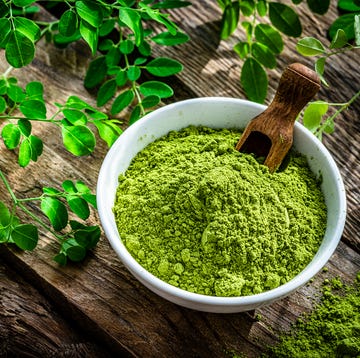It’s no secret (or surprise) that a lot of us are really stressed out, especially as we continue to navigate a post-pandemic world where nobody is on the same page. And with that stress comes another stressor, which is how to manage and eliminate all of that … well, stress! Stress can be stressful, but you’re definitely not alone: 33% of adults say they have too much day-to-day stress to think about their future and 36% of adults say that they’re not sure where to start when it comes to managing stress, according to the American Psychological Association’s Stress in America 2023 survey.
No matter where you fall on the stress scale, chances are that you’ve explored ways to lighten your mental load, and you’ve probably seen the word “Ashwagandha” floating around as one of the wellness world’s buzziest new stress-relief supplements. And you also may have some questions about this unfamiliar potential stress cure.
We know we did, so we asked Ayurvedic experts what to know about Ashwagandha, including when to take it to get the best results.
What is Ashwagandha?
“Ashwagandha is an evergreen shrub native to India, Pakistan, the Middle East, the Mediterranean and Africa; the root has traditionally been used in Ayurvedic medicines as an aphrodisiac, liver tonic, anti-inflammatory and potential pathway to vitality and longevity,” says BreAnna Guan, N.D., licensed naturopathic physician.
Now, this centuries-old Eastern medicine go-to has gone mainstream, and you’ll see it in teas and other beverages, as well as lining the supplement shelves at pharmacies and vitamin shops. One big reason for its popularity spike is due to its potential to ease stress, steady mood and promote body-wide balance — all of which may be possible because Ashwagandha is considered an “adaptogen.”
“This plant belongs to a class of herbs called ‘adaptogens,’ which are perhaps the most important botanicals in traditional herbalism, as they uniquely boost the capacity of our nervous systems and endocrine glands to maintain homeostasis (balance), even during times of intense emotional or physical stress,” explains Olivia Amitrano, herbalist and founder of Organic Olivia.
There are two parts to this word: ADAPT (which means to change something to help it function better amidst the current circumstances) and GEN (a substance that generates), Amitrano adds, so “adaptogens help to generate a greater sense of resilience, and help us to adapt to the stressors in our lives by preventing full-on hormonal chaos when things go awry.”
Editor's note: You should always talk to your doctor or a dietitian before adding a new supplement to your daily regimen.
Health benefits of Ashwagandha
Stress relief, relaxation and mood balance are some of the potential benefits that most of us will be after when seeking out Ashwagandha — but is there any solid scientific proof that this herb really helps?
“We have plenty of anecdotal evidence through those 6,000-plus years of use in Ayurvedic medicine, and now modern scientific literature is starting to explore the use and potential benefits of this plant,” Amitrano says.
For instance, taking Ashwagandha daily for eight weeks resulted in a significant reducing in stress and cortisol levels, as well as improved sleep compared to a placebo group, according to one small 2019 study by Indian researchers. Another small study in the Journal of Alternative and Complementary Medicine showed that Ashwagandha supplementation helped improve levels of several thyroid hormones. This is relevant because, “stress can affect your thyroid by down-regulating thyroid hormone production during long periods of stress to conserve energy,” Amitrano explains.
A 2021 research review of both human and animal studies which suggests that Ashwagandha could be a helpful tool in managing depression, anxiety, insomnia and other mental health-related issues. And Ashwagandha was found to be effective at alleviating stress in a small 2023 study.
“One of the great things about Ashwagandha, and perhaps why it has become such a popular herbal supplement, is that there is research to back up anecdotal claims, and its many benefits are perfectly paired for our modern-day problems, such as sleep support and stress and anxiety relief. This is why I find many reasons to recommend it in my practice,” Dr. Guan says.
When is the best time to take Ashwagandha?
There’s no research to say whether it’s better to take Ashwagandha in the morning or at night. However, Dr. Guan recommends taking it with meals to avoid any potential stomach upset, a side effect that some people experience when taking vitamins or supplements.
Ashwagandha may make some people feel vitality through mental clarity, while it may also induce feelings of calmness and relaxation, so it can be a good idea to try taking it both in the morning and in the evening to see how it affects you — then you can decide when it best fits into your routine. “For a very small number of folks, it may make them feel initially a bit more energetic, so when taking it for the first time, I think it’s best to give it a try earlier in the day in order to gauge your response,” Amitrano says. “If you feel calm and at ease, you may switch to taking it at night before bed," as a natural sleep aid.
More FAQs
Stefani (she/her) is a registered dietitian, a NASM-certified personal trainer and the director of the Good Housekeeping Institute Nutrition and Fitness Lab, where she oversees all nutrition and fitness-related content, testing and evaluation. She holds a master’s degree in clinical nutrition from New York University, as well as advanced certifications as a Women's Fitness Specialist and a Behavior Change Specialist. Stefani is dedicated to providing readers with evidence-based content to encourage informed food choices and healthy living. She is an avid CrossFitter and a passionate home cook who loves spending time with her big fit Greek family.













